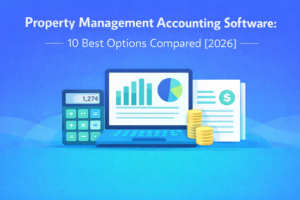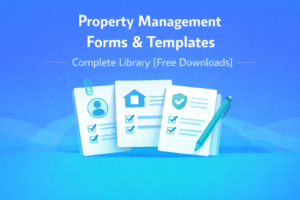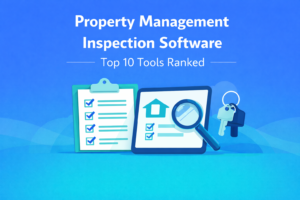
Are you thinking of starting a property management company? It’s a competitive industry with over 307,000 property management companies in the US today. From crafting your business plan to picking services, setting fees, hiring staff, and finding vendors, there’s a lot on the to-do list.
How to start property management company? If you need help determining where to begin, this post walks you through the eight steps to kickstart and run a successful property management business.
Let’s get started!
Step 1: Research the Property Management Industry
Know Your Competitors & Target Audience
In any business, it is crucial to identify what your competitors are doing to determine your success. Property business is no exception.
Thorough research and analysis of their services, pricing structures, and marketing strategies will provide you with a better understanding of the market and where you stand if you enter the market. Your competitors can be your best teachers, so it is important to observe and learn from them.
Next, let’s figure out who your target audience is. You can’t serve everyone in property management, especially when you’re just starting out. So, choose wisely whether you want to focus on single property owners or multiple ones. The research you did earlier will also help in this aspect.
Estimate Startup and Recurring Costs
It’s important to accurately estimate the costs of starting a business to ensure its success. This is particularly important because these costs can often be relatively low initially. It’s crucial to consider ongoing expenses such as office rent, employee salaries, and property maintenance charges to create a comprehensive financial plan for the business.
Housing, Economic, and Demographic Trends
Market research is essential in property management, or any business venture for that matter. It helps you understand the condition of the market and whether it’s a good time to invest. You should examine different property types, study disposable income levels, and research average rental and purchase prices per square foot.
This comprehensive approach will provide valuable insights that can guide your decision-making in the real estate market. Additionally, it will give you an idea of current housing trends, economic indicators, and demographics specific to your area.
Step 2: Define Your Property Management Services
When starting a property management business, it is essential to determine the range of services you will offer. These may include daily maintenance tasks such as landscaping upkeep, rent collection services to streamline payments, and professional leasing services to attract and retain tenants effectively.
Moreover, you should evaluate the resources necessary for your selected services. This should consider factors such as office space and equipment needs, as well as determining the optimal number of employees required to deliver the services effectively.
Step 3: Get Property Management Certifications
It is essential to acquire the required licenses, which may include the Real Estate Broker license, Property Manager’s license, and Leasing Agent license, based on the specific regulations in your state. These licenses are critical in ensuring compliance and delivering professional services in the real estate sector.
Furthermore, discover valuable certifications from well-known associations such as the Institute of Real Estate Management (IREM) or the National Association of Realtors (NAR) to boost your expertise and credibility in the real estate industry. These certifications can provide specialized knowledge and skills to set you apart in your career.
Step 4: Set Your Property Management Fees & Rates
Understand standard property management fees. These fees typically encompass setup fees for initial property management services, ongoing management fees for continual oversight, leasing fees for tenant placement, eviction fees for legal proceedings related to tenant removal, and leasing renewal fees for extending tenant agreements.
Plus, selecting a fee-setting method is crucial for your business. You can opt for percentage-based, flat, or a combination to balance generating income and staying competitive.
Step 5: Draft Property Management Legal Contracts

Making firm contracts is essential for having good professional relationships. When you make clear and detailed agreements, it helps to avoid arguments, define important terms, and make sure everyone agrees. This way, businesses can protect their interests and build trust and clarity in their dealings.
Include specific details in the contract, like coverage for off-duty situations, how management fees will be handled, the hours of work including overtime rules, budgets for regular maintenance, emergency funds for unexpected situations, and clear descriptions of the services, explaining duties and responsibilities thoroughly. This way, everyone knows what to expect and can work together smoothly.
Step 6: Pen a Property Management Business Plan
Executive Summary
Write a concise executive summary that encapsulates your business overview, market analysis including target demographics and competitors, sales and marketing strategy outlining key tactics and channels, management structure with key team members’ roles, financial plan covering revenue projections and cost breakdown, and funding requirements specifying the amount needed and potential sources such as loans or investors.
Business Overview
Introduce your property management business, including details on services such as property maintenance, tenant screening, rent collection, and lease agreements. Share information on your competitive rates, transparency in financial reporting, and personalized customer service. Highlight your service area coverage in residential and commercial properties across the city and neighboring suburbs.
Market Overview
It’s critical to dig into the market size to grasp the opportunities. Understanding this scale will guide you in pinpointing your target customers and tailoring strategies effectively. Looking into demographic trends gives you a better insight into consumer behavior. Plus, a quick look at your competitors helps you strategize well in this competitive landscape.
Sales & Marketing Strategy
Detail your strategies for attracting customers by utilizing digital marketing channels such as social media campaigns, email marketing, and search engine optimization. Emphasize your unique selling points to create a strong brand identity and build long-lasting customer relationships. Highlight quality, innovation, and exceptional customer service to stand out from competitors.
Management & People
Present the proposed management structure that outlines the roles and responsibilities of key team members. Detail the team’s extensive experience, highlighting their diverse skill sets and past successes. Discuss the strategic hiring plans to complement the existing team and ensure future growth. Lastly, introduce the key personnel who will drive the company’s vision and mission forward with their expertise and leadership.
Financial Plan
Include a detailed 5-year financial projection summarizing revenue, gross profit, net profit, and break-even point to provide a comprehensive overview of the financial trajectory and sustainability of the business over the projected period.
Funding Ask
Provide details on the type of funding or investment you seek, including the amount required and the duration for which it will be utilized. This information will help you better understand your financial needs and goals.
Step 7: Hire Property Management Staff & Vendors
Identify roles within the organization based on specific job requirements and company needs. Advertise job vacancies through various channels to attract qualified candidates.
Once the hiring process is complete, onboard new staff members by providing comprehensive training to equip them with the necessary skills. Align the new hires with the company’s core values and goals to foster a sense of belonging and purpose. Continuously nurture a positive company culture through open communication, recognition of achievements, and creating a supportive work environment.
Then, engage with various vendors to support your business operations. This includes collaborating with professionals such as real estate lawyers for legal matters, accountants for financial guidance, contractors for physical infrastructure, IT staff for technical support, and customer service representatives for client interactions. It is crucial to verify that each vendor possesses the required licenses and insurance to protect your business interests.

Step 8: Promote Your Property Management Agency
Establish an Online Presence
Create a professional business website to effectively engage with customers. Showcase a wide range of available properties, from cozy apartments to luxurious estates, complete with detailed pricing and precise location information. Harness the power of cutting-edge technology to streamline the website setup process, ensuring a swift and seamless online presence for your real estate business.
Marketing Strategies
Promote your property management company effectively by utilizing targeted search ads on Google Ads. Enhance your reach further by running engaging social media ad campaigns on platforms like Facebook and Instagram. Create compelling content that resonates with your audience to drive brand awareness and customer engagement.
Wrapping it Up
Starting a property management business is a multifaceted endeavor that demands meticulous research, strategic planning, and strict compliance with legal stipulations.
By methodically following these essential steps, you can pave the path toward building a thriving and competitive presence within the dynamic property management sector.
Remember, attention to detail, customer service excellence, and continuous adaptation to market trends are paramount for sustained success in this industry.
Table of Contents
Stay Updated
Subscribe to get the latest news, industry trends, blog posts, and updates...




